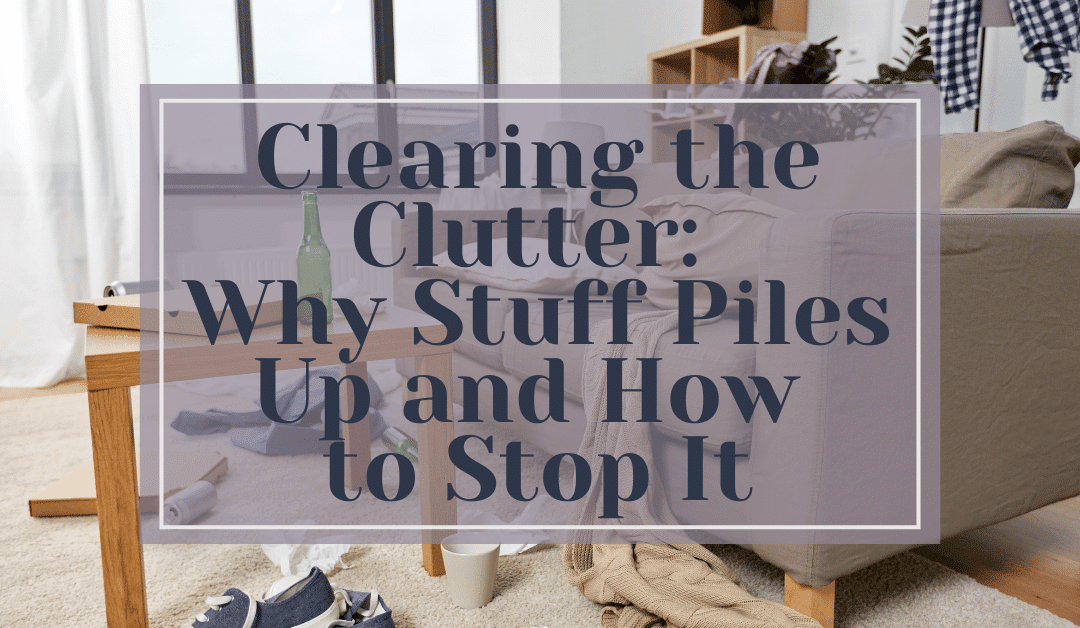I know how overwhelming clutter can feel. With two teenagers, a husband and a dog at home, I understand just how quickly things can spiral out of control. One minute, the kitchen is spotless, and the next, the counter is buried under school papers, stacks of dishes, and a million cups, while the floor is all of a sudden covered in dirt, sand, or snow my dog has tracked in from outside. And it’s not just the physical mess—it’s the mental clutter, too. The endless to-do lists, the unfinished projects, and the constant feeling that there’s just too much to keep up with.
Sound familiar? You’re not alone.
Clutter sneaks up on all of us, whether it’s too much stuff, disorganization, or procrastination. But the good news is, once you understand why clutter builds up, you can take small, intentional steps to keep it under control. Let’s break down some of the most common causes of clutter—and, more importantly, how to stop them from taking over your space and mind.
Clutter, according to the dictionary, is simply a collection of things that are disorganized or in disarray. It can be both physical (the stuff piling up in your home, office, or car) and mental (the to-do lists, unfinished projects, and decisions left hanging).
Several factors can contribute to clutter: too much stuff, disorganization, and procrastination.
Too Much Stuff
I get it—there’s always something new to buy, and it can be so tempting to pick up that “one thing” that promises to make life easier or more fun. But living with two teenagers means things seem to multiply quickly. One day, it’s a new set of shoes, the next, a pile of jackets and backpacks are scattered everywhere. And then there’s my husbands tendency to hold onto items “just in case.” What I’ve learned is that when there’s too much stuff in the house, it starts to lose its value. I’ve started being more intentional about what comes into my space—asking myself, “Do I really need this? Will I use it?” The result? I’m surrounded by items that truly bring value and meaning, not just more things to manage.
Disorganization
When you live in a busy household like mine, things can get out of hand quickly. I used to be guilty of tossing things wherever I could find space, especially during busy or stressful moments when it felt like there was too much to keep track of. I’d think, “I’ll deal with this later,” and before long, papers, keys, and random items were scattered all over the house. This kind of disorganization was a big time-waster. I’d waste precious minutes, even hours, searching for things I had misplaced. It wasn’t just the mess—it was the mental load of not being able to find what I needed. Over time, I started putting systems in place. Now, I try to put things away right away or create designated spots for everything. It’s made a huge difference in how quickly I can find what I need and how much more at peace I feel in my space.
Procrastination
Clutter builds up quickly when decisions or actions are put off. You think you’ll get to it later, but “later” never seems to come. I used to do this with the supper dishes. After dinner, I’d tell myself, “I’ll get to them after I relax for a bit,” but somehow, that “bit” turned into hours. Before I knew it, the dishes were piled high, and it felt like a bigger task than it should’ve been. The problem with procrastination is that it doesn’t just leave physical clutter; it also clutters your mind, making it harder to focus on what’s important.
The good news? You can stop clutter from taking over your life. A big part of this is being intentional about the things you allow into your space.
Before bringing anything new into your home, office, or car, ask yourself:
✔️ Do we really need it?
✔️ Will we use it?
✔️ Do we love it?
If the answer to “Do we need it?” is no, then it’s probably best to skip the purchase. Instead of letting clutter build up, commit to staying organized. When you have systems in place for putting things away, it becomes easier—and less frustrating—when you need something.
Lastly, tackle procrastination. When you make decisions and take action, you prevent that mental clutter from piling up, keeping you more focused and productive.
By being mindful of what you bring into your life and staying organized, you’ll reduce the clutter. The best part is, you’ll create space for the things that matter most.



Clutter is something most people will always have to deal with, yet your suggestion to think before you buy is a very good one. The less we bring into our homes, the less we have to deal with later. And it’s a big help to organizationally-challenged folks!
Thank you, Jylian
Decluttering is an ongoing process for sure! I just spent a whole evening not long ago going through all my jewellery and now have a big bag of items I don’t wear to donate!